Books
Books
English editions

How To Wash A Heart
How To Wash A Heart, Kapil's first full-length collection published in the U.K., depicts the complex relations that emerge between an immigrant guest and a citizen host. Drawn from a first performance at the ICA in London in 2019, and using poetry as a mode of interrogation that is both rigorous, compassionate, surreal, comic, painful and tender, by turn, Kapil begins to ask difficult and urgent questions about the limits of inclusion, hospitality and care.
Winner of the T.S. Eliot Prize 2020.
Poetry Book Society Choice for Summer 2020.
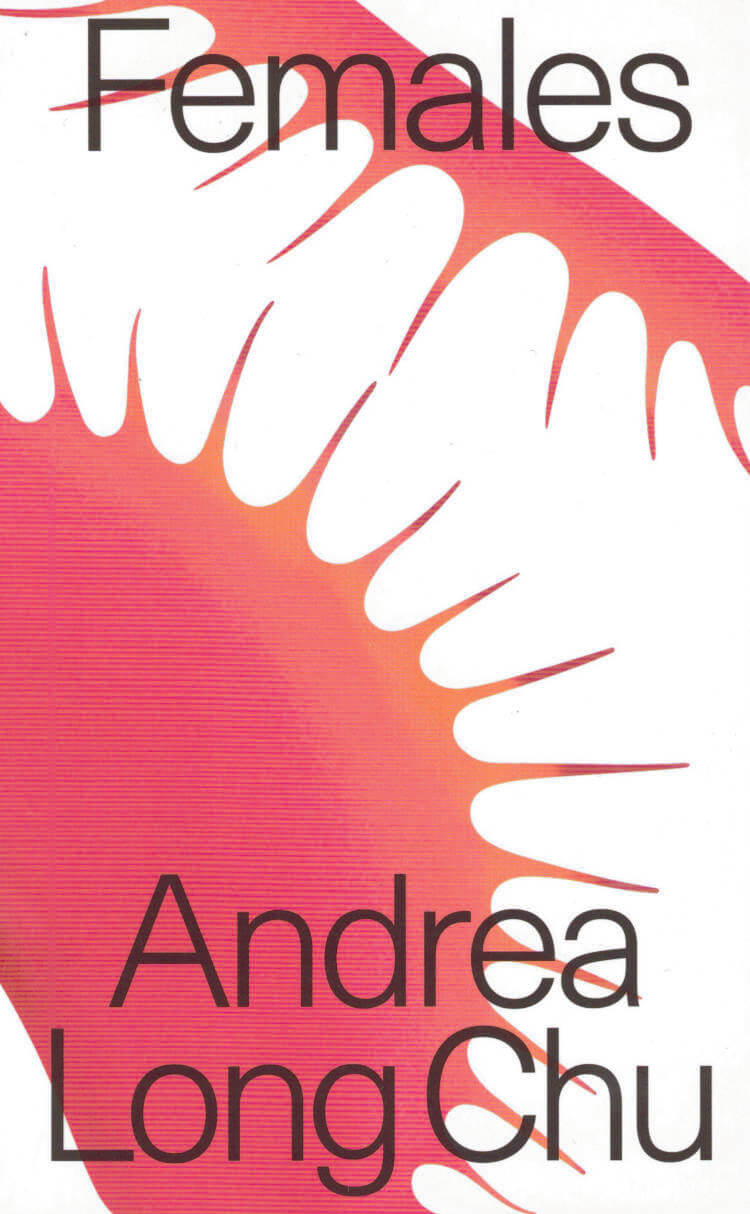
Females
Females is Andrea Long Chu's genre-defying investigation into sex and lies, desperate artists and reckless politics, the smothering embrace of gender and the punishing force of desire.
Drawing inspiration from a forgotten play by Valerie Solanas—the woman who wrote the SCUM Manifesto and shot Andy Warhol—Chu aims her searing wit and surgical intuition at targets ranging from performance art to psychoanalysis, incels to porn. She even has a few barbs reserved for feminists like herself. Each step of the way, she defends the indefensible claim that femaleness is less a biological state and more a fatal existential condition that afflicts the entire human race— men, women, and everyone else. Or maybe she's just projecting.
A thrilling new voice who has been credited with launching the "second wave" of trans studies, Chu shows readers how to write for your life, baring her innermost self with a morbid sense of humor and a mordant kind of hope.

The Sacred Conspiracy
Georges Bataille's secret society, long the stuff of legend, is now revealed in its texts, meditations, rules and prohibitions.
This book recounts what must be one of the most unusual intellectual journeys of modern times, in which the influential philosopher, cultural theorist and occasional pornographer Georges Bataille (1897-1962), having spent the early 1930s in far-left groups opposing the rise of fascism, abandoned that approach in order to transfer the struggle onto the mythological plane.
In 1937, Bataille founded two groups in order to explore the combinations of power and the sacred at work in society. The first group, the College of Sociology, gave lectures that were intended to reveal the hidden undercurrents within a society on the verge of catastrophe. The second group was Acéphale, a genuine secret society and anti-religion whose emblem was a headless figure that, in part, represented the death of God. Until the discovery a few years ago of the group's internal papers (which include theoretical texts, meditations, minutes of meetings, rules and prohibitions and even a membership list), almost nothing was known of its activities.
This book is the first to collect a representative selection of the writings of Bataille, and of those close to him, in the years leading up to World War II. The texts published here comprise lectures given to the College of Sociology by Bataille, Roger Caillois and Michel Leiris, essays from the Acéphale journal and a large cache of the internal papers from the secret society. A desperate narrative unfolds, wherein Bataille risked all in a wholly unreasonable quest—with a few fellow travelers, he undertook what he later described as a journey out of this world.
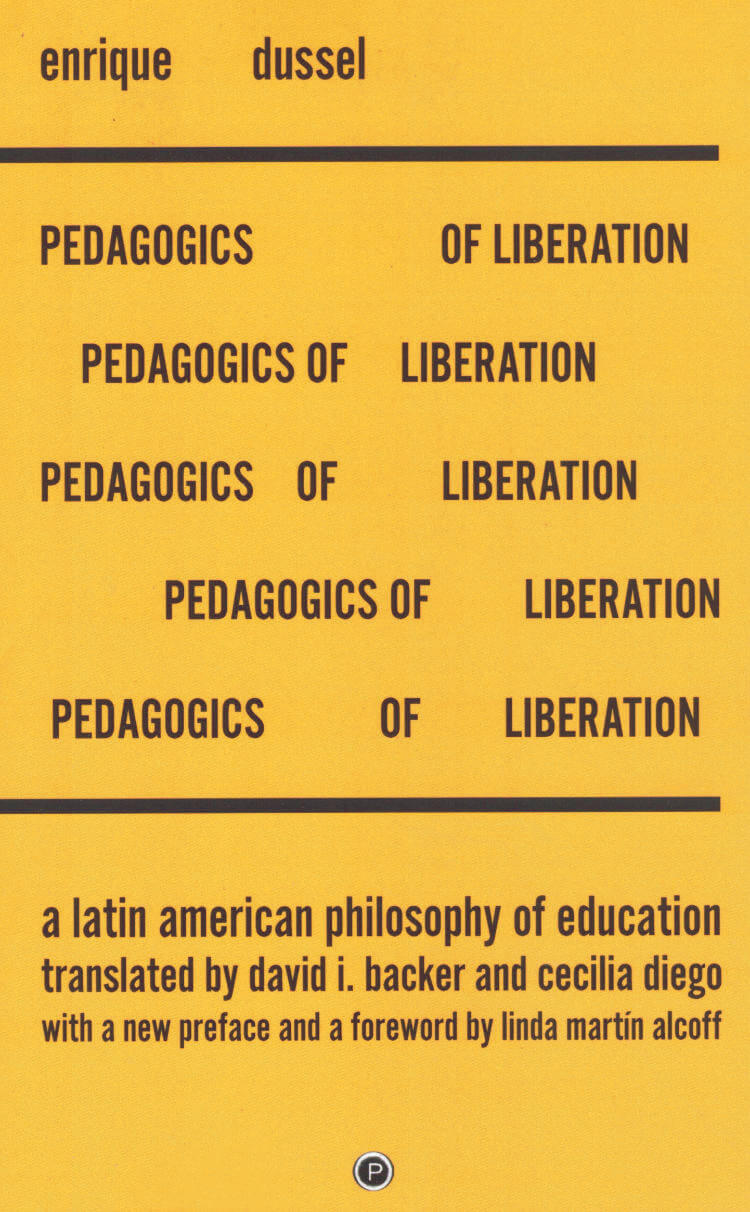
Pedagogics of Liberation: A Latin American Philosophy of Education
Enrique Dussel is considered one of the founding philosophers of liberation in the Latin American tradition, an influential arm of what is now called decoloniality. While he is astoundingly prolific, relatively few of his works can be found in English translation - and none of these focus specifically on education. Founding members of the Latin American Philosophy of Education Society David I. Backer and Cecilia Diego bring to us Dussel's THE PEDAGOGICS OF LIBERATION: A Latin American Philosophy of Education, the first English translation of Dussel's thinking on education, and also the first translation of any part of his landmark multi-volume work Towards an Ethics of Latin American Liberation.
Drawing heavily from the ethical philosophy of Emmanuel Levinas, Dussel examines the dominating and liberating features of intimate, concrete, and observable interactions between different kinds of people who might sit down and have face-to-face encounters, specifically where there may be an inequality of knowledge and a responsibility to guide, teach, learn, care, or study: teacher-student, politician-citizen, doctor-patient, philosopher-nonphilosopher, and so on. Those occupying the superior position of these face-to-face encounters (teachers, politicians, doctors, philosophers) have a clear choice for Dussel when it comes to their pedagogics. They are either open to hearing the voice of the Other, disrupting their sense of what is and should be by a newness beyond what they know; or, following the dominant pedagogics, they can try to communicate and instruct their sense of what is and should be to the (supposed) tabula rasas in their charge. Dussel calls that sense of what is and should be "lo Mismo."
This groundbreaking translation makes possible a face-to-face encounter between an Anglo Philosophy of Education and Latin American Pedagogics. "Pedagogics" should be considered as a type of philosophical inquiry alongside ethics, economics, and politics. Dussel's pedagogics is a decolonizing pedagogics, one rooted in the philosophy of liberation he has spent his epic career articulating. With an Introduction by renowned philosopher Linda Martin Alcoff, this book adds an essential voice to our conversations about teaching, learning, and studying, as well as critical theory in general.
ENRIQUE DUSSEL was born in 1934 in the town of La Paz, in the region of Mendoza, Argentina. He first came to Mexico in 1975 as a political exile and is currently a Mexican citizen, Professor in the Department of Philosophy at the Iztapalapa campus of the Universidad Autónoma Metropolitana (Autonomous Metropolitan University, UAM), and also teaches courses at the Universidad Nacional Autónoma de México (National Autonomous University of Mexico, UNAM).

The Politics of Poetic Form
The Politics of Poetic Form: Poetry And Public Policy is a series of essays from a discussion that occurred at the New School for Social Research in New York. The discussion mines the relationship between poetic composition and political expression. Poetry's relationship to public policy typically has a questionable margin of relation. Not only does this volume posit that poetry is a dynamic medium for the consideration of political ideas, it focuses on the ideological weight specific formal innovations bring to poetry. Some of the writers include Jerome Rothenberg, Ron Silliman, Susan Howe, Nathaniel Mackey and Charles Bernstein.
Charles Bernstein (born April 4, 1950) is an American poet, theorist, editor, and literary scholar. Bernstein holds the Donald T. Regan Chair in the Department of English at the University of Pennsylvania. He is one of the most prominent members of the Language (or L=A=N=G=U=A=G=E) poets. In 2006 he was elected a Fellow of the American Academy of Arts and Sciences. In 2005, Bernstein was awarded the Dean's Award for Innovation in Teaching at the University of Pennsylvania. He has also been a visiting professor at Columbia University, Brown University, and Princeton University.

Undersong
'Undersong is a remarkable poetic document. It comprises a thoroughgoing revision of Lorde's early poems, 1950-1979, along with nine hitherto unpublished poems from that period, and an essay describing the revision process. Readers new to Lorde's work will meet here a major American poet whose concerns are international, and whose words have left their mark on many lives. Readers of "The Black Unicorn", "Sister Outsider", "The Cancer Journals", "A Burst of Light", and "Our Dead Behind Us", and the thousands who have attended her poetry readings and speeches, will recognize in this book the roots and the growing-points of a transformative writer. Never has a poet left so clear and conscious a track of artistic choices made in the trajectory of a life. Far from rewriting old poems to fit a changes historical moment, she has finely rehoned formal elements to illuminate the original poems. Throughout, Lorde's lifelong themes of love and anger, family politics, sexuality, and the body of the city can be seen gathering in power and clarity.' - Adrienne Rich
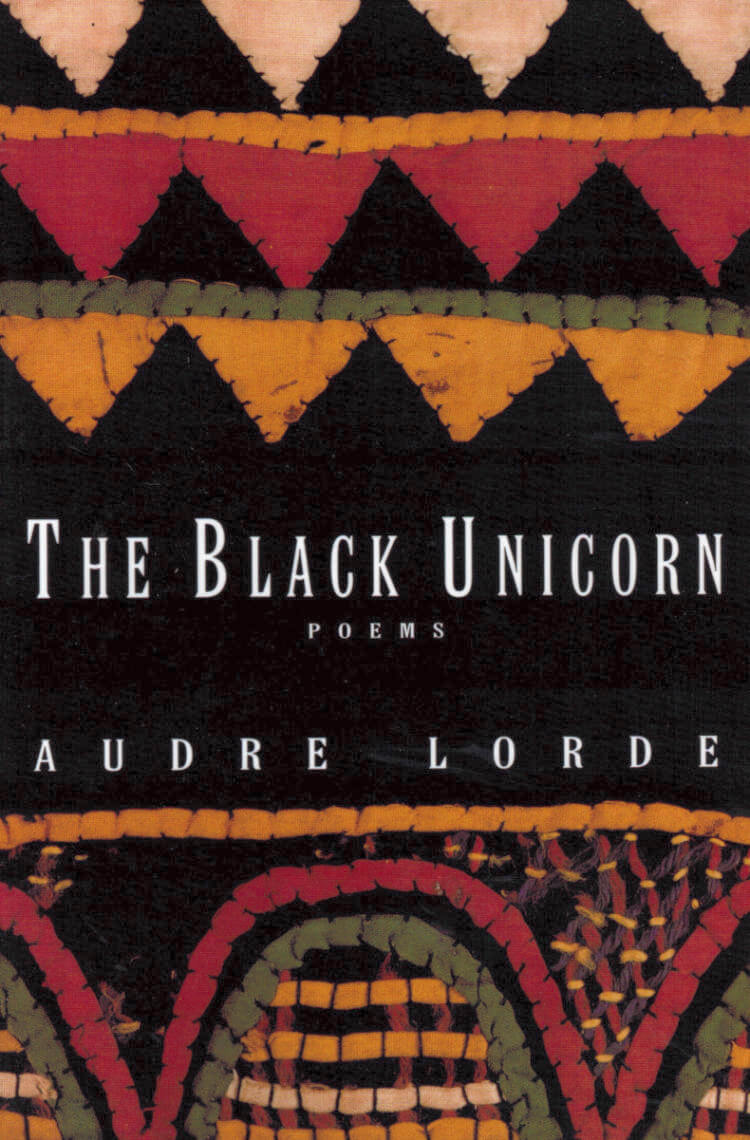
The Black Unicorn
The Black Unicorn is a collection of poems by a woman who, Adrienne Rich writes, "for the complexity of her vision, for her moral courage and the catalytic passion of her language, has already become, for many, an indispensable poet."
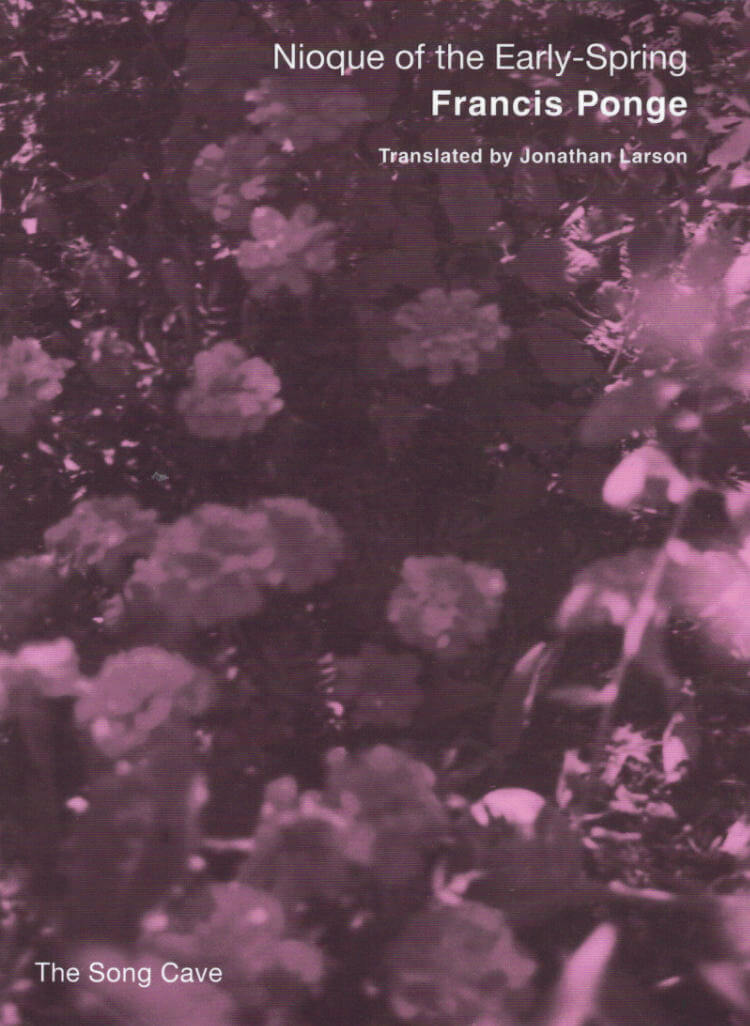
Nioque of the Early-Spring
Translated from the French by Jonathan Larson.
On the 50th anniversary of its publication, The Song Cave presents the first English translation of Francis Ponge's NIOQUE OF THE EARLY-SPRING. Ostensibly a book written to honor the season itself and the cycle of time, upon its first publication in Paris, May 1968, these notes took on a greater metaphorical meaning within this context, addressing the need for new beginnings and revolution.
April is not always the cruelest month. In these stray notations dated early April 1950, Ponge provides a latter-day version of Stravinsky's 'Sacre du printemps' or of William Carlos Williams' 'Spring and All', a vernal enactment of all the resurrectional energies of a spring-time-to-come, as witnessed firsthand at the farmhouse of 'La Fleurie' in southern France. When subsequently published in Tel Que in May 1968, eighteen years later, Ponge's rural, pastoral text now acquired a specific urban history and Utopianism, its Lucretian 'Nioque, ' or gnosis, now speaking to the gnomic revolutionary slogans of the Left Bank barricades: 'Be realistic, demand the impossible, ' 'Beneath the cobblestones, the beach.' Jonathan Larson's careful engagement with Ponge manages to seize what is most prosaic about his poetry—its fierce communism of the ordinary, its insistence that taking the part of things means taking words at their most etymological everydayness. - Richard Sieburth
This startlingly fresh and necessary document of the 1950s by Francis Ponge comes to us via the all too rare feat of true poetic reenactment. Understanding that each poet creates language anew, Jonathan Larson has found a poetics suitable for the occasion of Ponge's own poetic logic In this rendering, Larson's absolute care and attention to syllabic weight and measure, to the syntax and length of each line as it unwinds, allows us—as readers—to come into the drama of a text newly made, in other words, to discover a new poem in its very making. Yet, none of this comes at the cost of accuracy or through the subjugation of the original at the hands of one wielding the imperial language This is no mean feat in this day and age and, by way of Larson's exquisite ear, we are again given the poignancy and urgency of Ponge's own moment. - Ammiel Alcalay
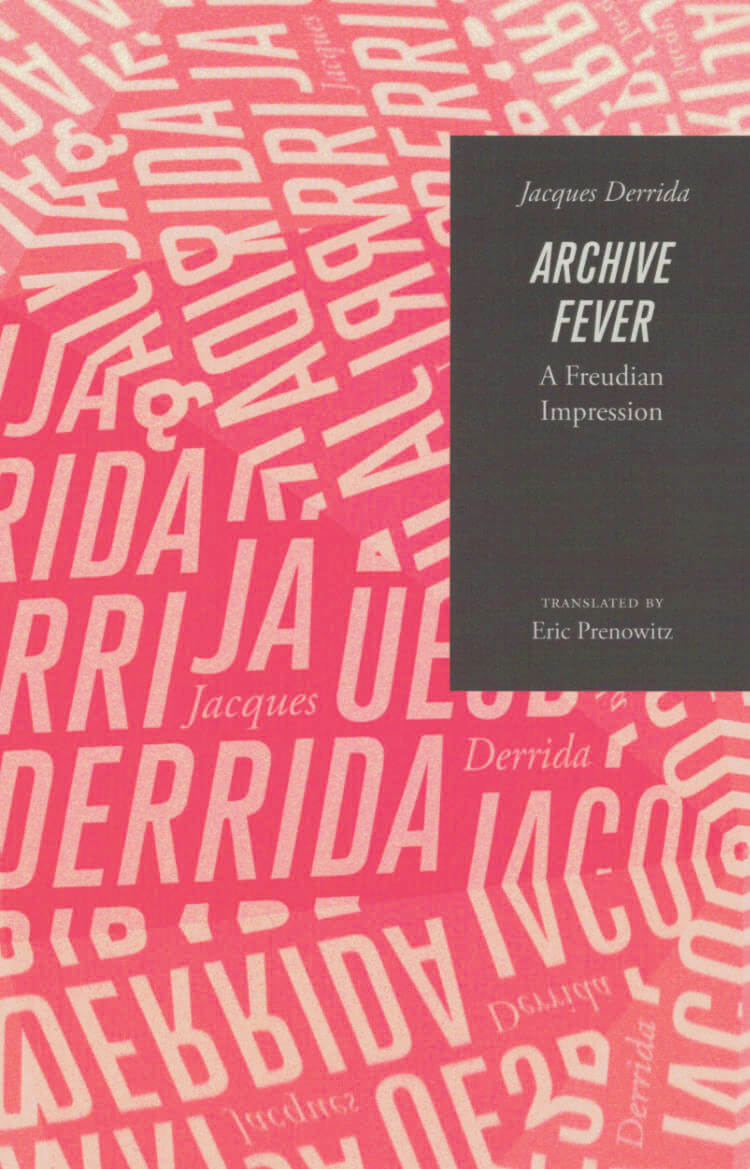
Archive Fever
In Archive Fever, Jacques Derrida deftly guides us through an extended meditation on remembrance, religion, time, and technology, fruitfully occasioned by a deconstructive analysis of the notion of archiving. Intrigued by the evocative relationship between technologies of inscription and psychic processes, Derrida offers for the first time a major statement on the pervasive impact of electronic media, particularly e-mail, which threaten to transform the entire public and private space of humanity. Plying this rich material with characteristic virtuosity, Derrida constructs a synergistic reading of archives and archiving, both provocative and compelling.

Without Alibi
This book brings together five essays by Jacques Derrida, which advance his reflections on many issues: lying, perjury, forgiveness, confession, the profession of faith, and, most recently, cruelty, sovereignty, and capital punishment.
Strongly linked by their attention to "performatives" and the "as if," the essays show the necessity of thinking beyond the category of acts that are possible for a subject. Derrida argues forcefully that thought must engage with the im-possible, that is, the order of the unforeseeable event, the absolute future still to come. This acute awareness of the limits of performative programs informs the essays throughout and attunes them closely to events of a world undergoing "globalization."
The first essay, "History of the Lie," reviews some classic and modern definitions of the lie (Augustine, Rousseau, Kant, Koyré, Arendt), while renewing questions about what is called lying, as distinguished from other forms of nontruth. This inventive analysis is followed by "Typewriter Ribbon," which examines at length the famous lie recounted by Rousseau in his Confessions, when he perjured himself by accusing another of his own crime.
Paul de Man's reading of this textual event is at the center of Derrida's patient, at times seriously funny analyses. " Le parjure, Perhaps" engages with a remarkable novel by Henri Thomas that fictionalizes the charge of perjury brought against Paul de Man in the 1950s. Derrida's extraordinary fineness as a reader and thinker of fiction here treats, to profound effect, the "fatal experience of perjury."
The two final essays, "The University Without Condition" and "Psychoanalysis Searches the States of Its Soul," address the institutions of the university and of psychoanalysis as sites from which to resist and deconstruct the nontruth or phantasm of sovereignty. For the university, the principle of truth remains at the core of its resistance; for psychoanalysis, there is the obligation to remain true to what may be, Derrida suggests, its specific insight: into psychic cruelty. Resistance to the sovereign cruelty of the death penalty is just one of the stakes indicated by the last essay, which is the text of a keynote address to the "States General of Psychoanalysis" held in Paris, July 2000.
Especially for this volume, Derrida has written "Provocation: Forewords," which reflects on the title Without Alibi while taking up questions about relations between deconstruction and America. This essay-foreword also responds to the event of this book, which Peggy Kamuf in her introduction presents as event of resistance.
Without Alibi joins two other books by Derrida that Kamuf has translated for Stanford University Press: Points . . .: Interviews, 1974-1994 (1994) and Resistances of Psychoanalysis (1998).
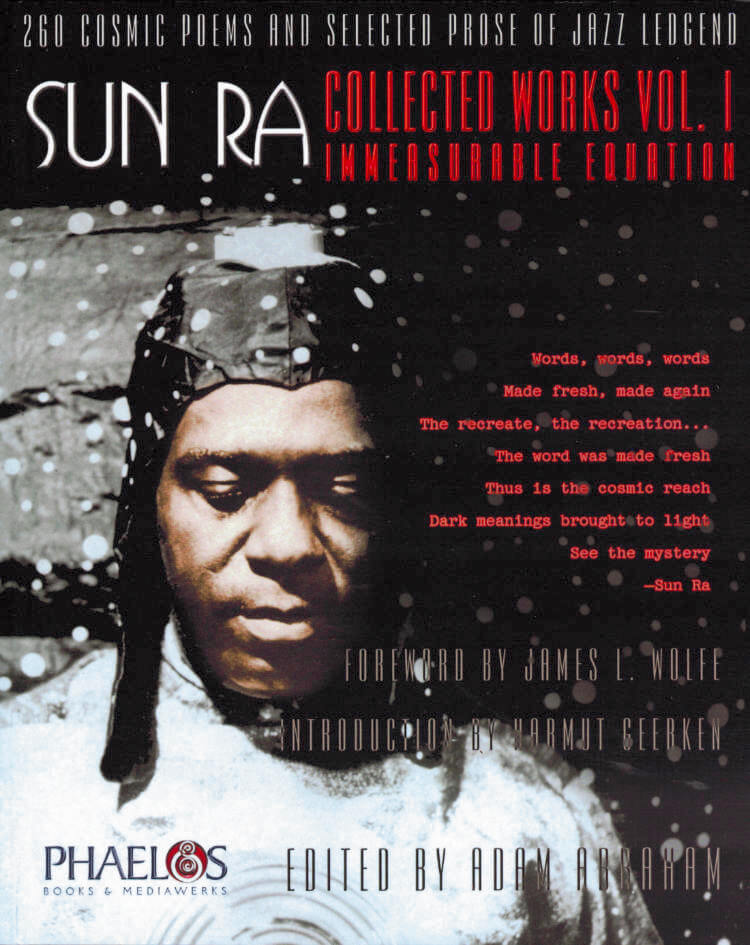
Immeasurable Equation
A stunning collection of 260 of Sun Ra's cosmic poems and selected prose.
Sun Ra's poetry leaves everything behind what's called contemporary, and flings out pictures of infinity into the outer space. These poems are for tomorrow.
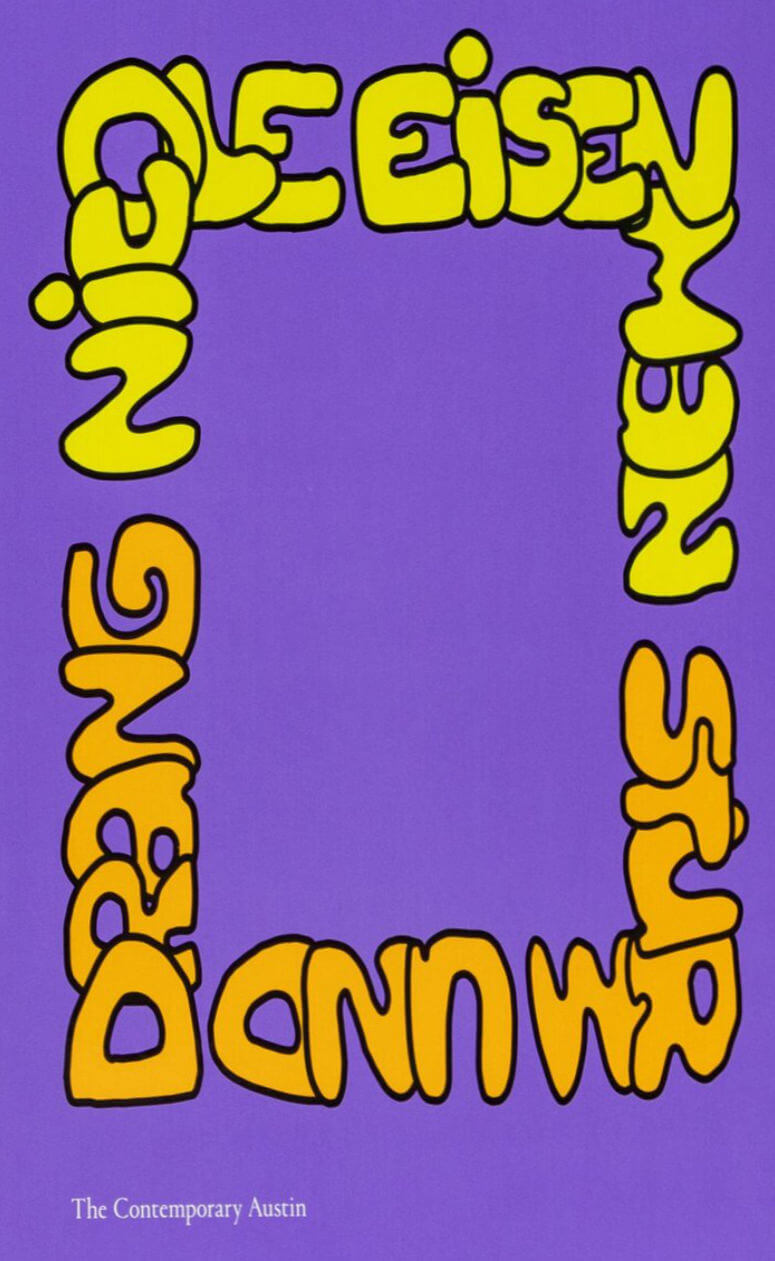
Sturm und Drang
This book accompanies the 2020 Suzanne Deal Booth / FLAG Art Foundation Prize exhibition, Nicole Eisenman: Sturm und Drang. The exhibition ran from February 27 through November 15, 2020, at The Contemporary Austin’s downtown venue, the Jones Center on Congress Avenue, with an outdoor sculpture at the museum’s fourteen-acre sculpture park at Laguna Gloria. A related exhibition of Eisenman’s work with a selection of drawings by Bay Area artist Keith Boadwee, Nicole Eisenman and Keith Boadwee, is on view at The FLAG Art Foundation in New York December 12, 2020, through March 13, 2021.
NICOLE EISENMAN was selected for the prize by an independent advisory committee comprising renowned curators and art historians from across the United States. The artist’s practice blends influences from Western art history and traditional figurative art with elements of punk, feminist activism, queer identity, humor, and emotional rawness to create profoundly unique works. Eisenman emerged in the early 1990s in New York City as a painter, and her creative output for nearly three decades centered on painting. More recently, however, the artist’s three-dimensional objects have overturned expectations of her work and of figurative sculpture. This publication reflects on the sculptural impulses within Eisenman’s work, considering the recent shift in her practice as both a new focus and always-present undercurrent brought to the surface.
Co-published with The Contemporary Austin and The FLAG Art Foundation
Essay by Heather Pesanti
Essay by Stephanie Roach and Jonathan Rider
Essay by Nicole Eisenman
Text by Litia Perta
Essay by Alhena Katsof
Conversation with Nicole Eisenman and Keith Boadwee
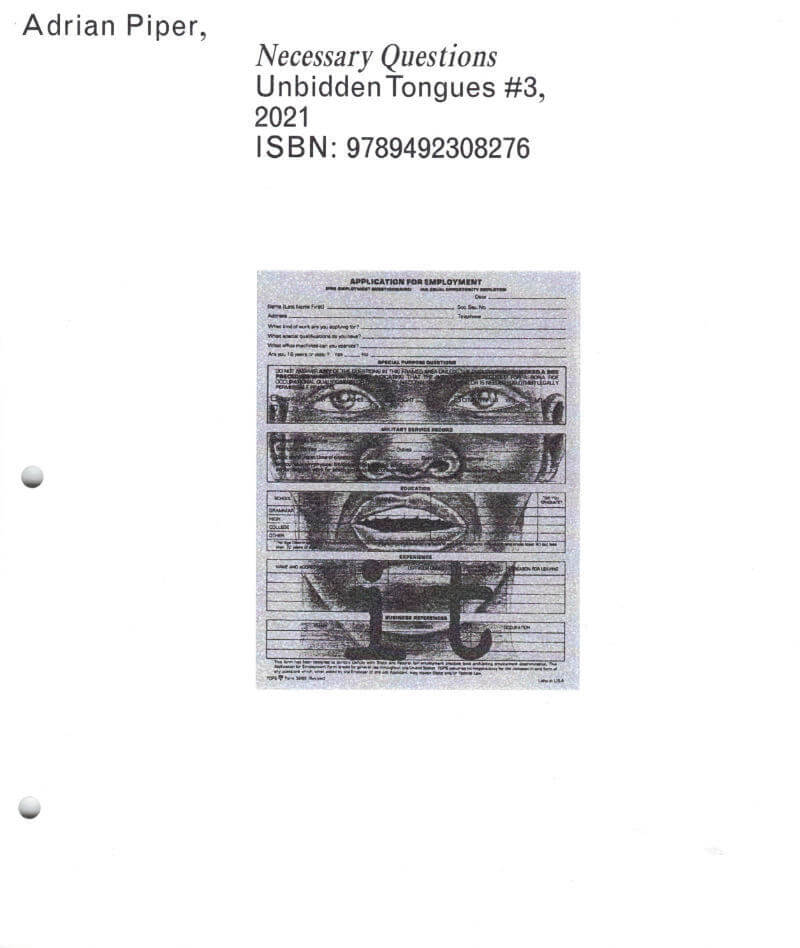
Adrian Piper: Necessary Questions
Consisting of an internal report written by conceptual artist and philosopher Adrian Piper in 1998, Necessary Questions takes Wellesley College, Massachusetts—where she was then on staff—as a case study in institutional racism and neglect. As such, the report could be read simply as an administrative document, though one drenched in meticulously clear advice that could still be, despite being written twenty-three years ago, taken up on a glaringly universal level. Yet the role the report went on to play in Piper’s life proves it’s not just a context-specific document, but an all-too-real example of exactly what it stood against: the ways in which the langue of protocol and the false façade of civility are utilised as tactics to ensure that one stays in their place.
It is the third title from Unbidden Tongues, a series edited by Isabelle Sully that focuses on previously produced yet relatively uncirculated work by cultural practitioners busy with questions surrounding civility and civic life—particularly so in relation to language.

Ruth Wolf-Rehfeldt: Introverse Arrangements
Introverse Arrangements is centred on the work of German artist Ruth Wolf-Rehfeldt who, despite only recently garnering attention for her work, is most known for a period of geometric and poetic typewriter drawings produced between the 1970s and 1990 while employed as an administrator for the German Democratic Republic.
It is the first title from Unbidden Tongues, a series edited by Isabelle Sully that focuses on previously produced yet relatively uncirculated work by cultural practitioners busy with questions surrounding civility and civic life—particularly so in relation to language.
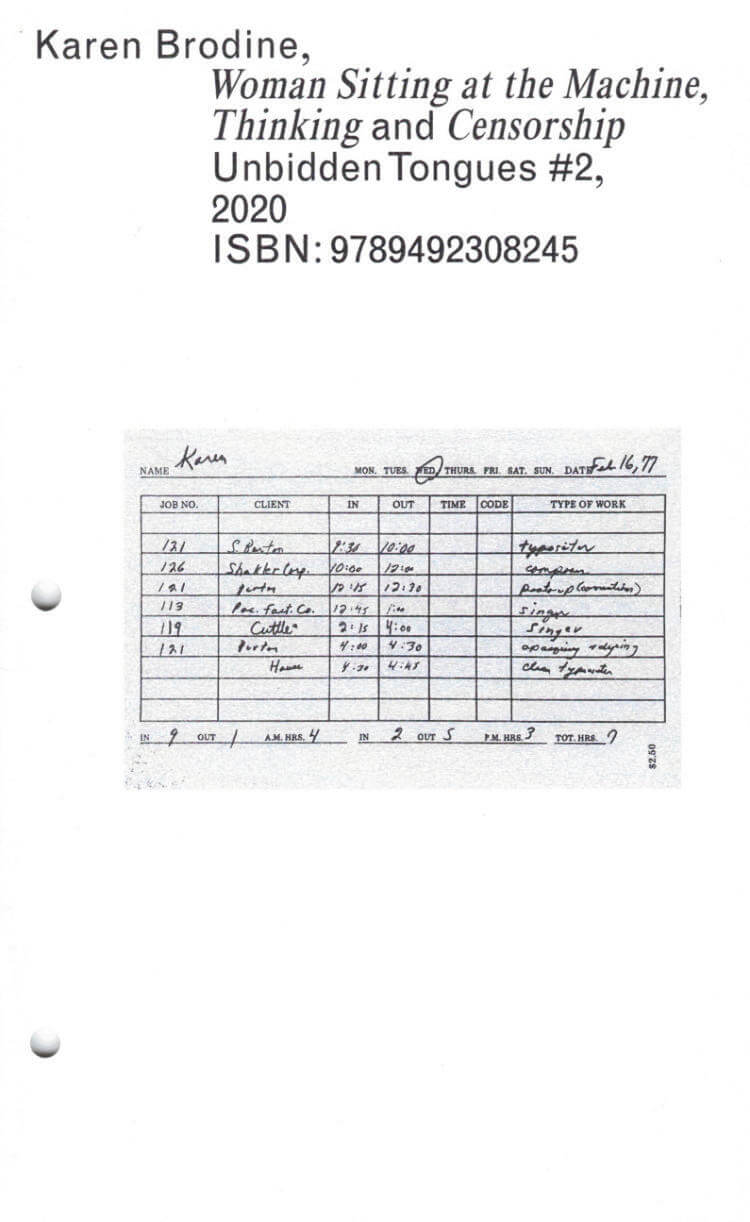
Karen Brodine: Woman Sitting At The Machine, Thinking And Censorship
Woman Sitting at the Machine, Thinking and Censorship is a two-part collection of poems by typesetter, activist and poet Karen Brodine. First published posthumously in 1990 as a reflection on her life as a typesetter, union organiser and lesbian, this series of ‘work poems’ chronicles labour struggles, both personal and collective, and draws on her experience growing up surrounded by socialist feminists immediately following the wrath of McCarthyism.
It is the second title from Unbidden Tongues, a series edited by Isabelle Sully that focuses on previously produced yet relatively uncirculated work by cultural practitioners busy with questions surrounding civility and civic life—particularly so in relation to language.

Why Call it Labor? On Motherhood and Art Work
This publication comprises four essays and one conversation with contemporary artists and curators discussing their experience of becoming mothers as professionals in the arts, its reality and effects. While their reflections represent a similar strata of art worker in terms of background, class, and career trajectory, the impact of instruments of patriarchy on rendering maternity invisible that they describe is recognizable and insidious.
Contributions by Mai Abu ElDahab, Basma Alsharif, Lara Khaldi, Mary Jirmanus Saba, and Mirene Arsanios with Nikki Columbus.
Edited by Mai Abu ElDahab
Published by Mophradat and Archive Books
Text design layout by Valerie Arif
Arabic and English
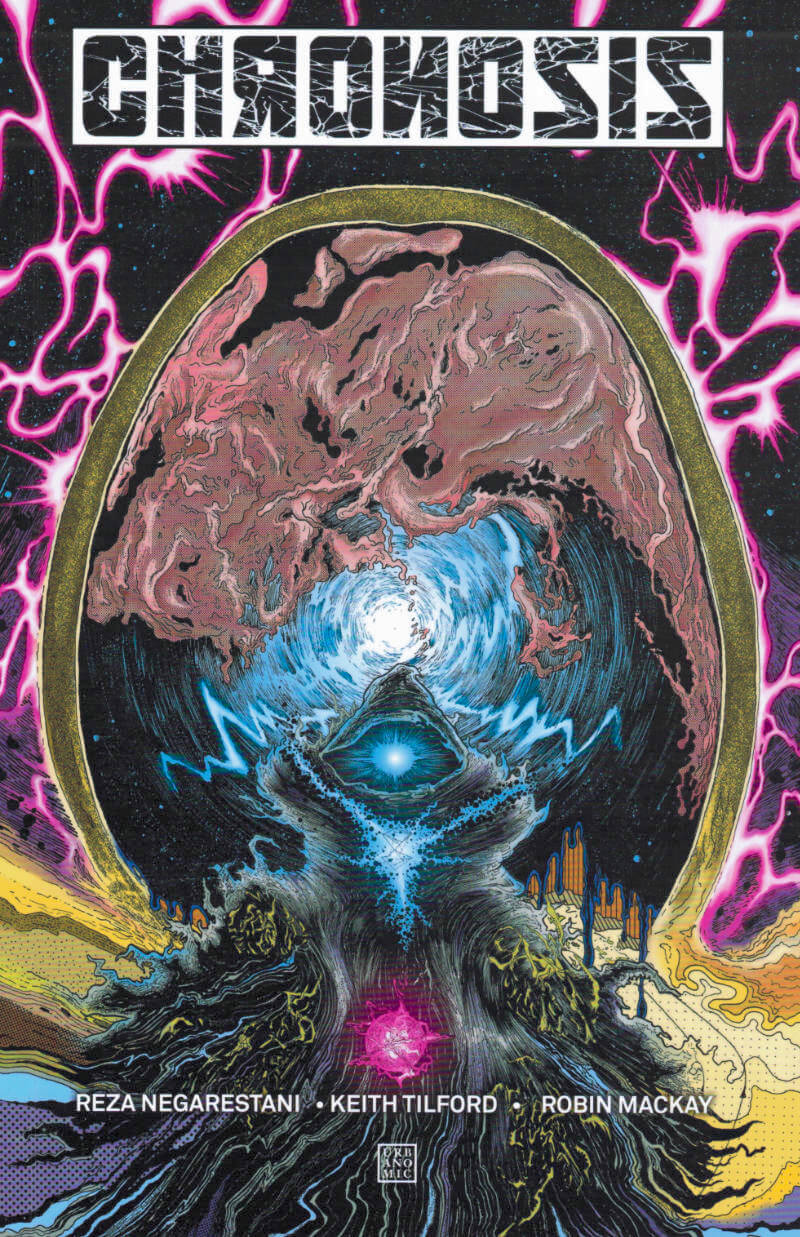
Chronosis
Reza Negarestani, Keith Tilford and 1 more
Approaching the comic medium as a supercollider for achieving maximum abstraction, in Chronosis artist Keith Tilford and philosopher Reza Negarestani create a graphically stunning and conceptually explosive universe in which the worlds of pop culture, modern art, philosophy, science fiction, and theoretical physics crash into one another.
Taking place after the catastrophic advent of the birth of time, Chronosis narrates the story of a sprawling multiverse at the center of which monazzeins, the monks of an esoteric time-cult, attempt to build bridges between the many fragmented tribes and histories of multiple possible worlds. Across a series of dizzying overlapping stories we glimpse worlds where time flows backward, where the universe can be recreated every five minutes, or where rigid facts are washed away by the tides of an infinite ocean of possibility.
A unique fusion of comics culture and philosophical cogitation, this conceptually and visually mind-expanding tale takes the reader on a dizzying rollercoaster ride through time, space, and thought.
This volume contains the entire Chronosis series in full color, along with additional background materials including early sketches, script notes, and alternative covers.
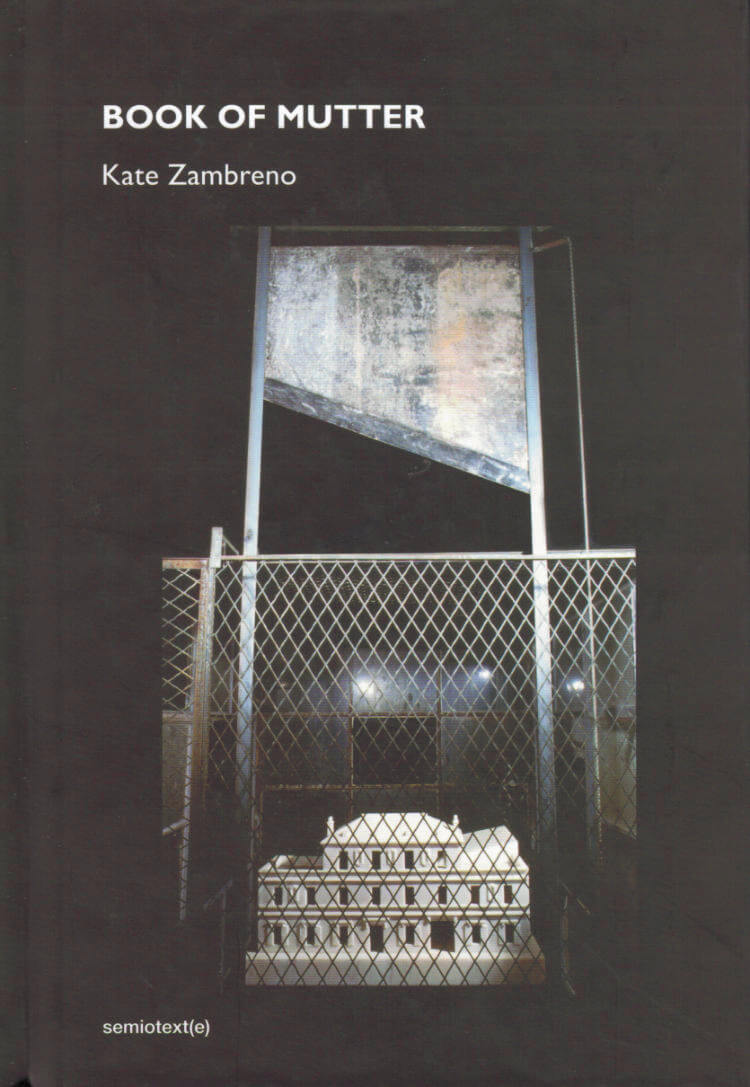
Book of Mutter
A fragmented, lyrical essay on memory, identity, mourning, and the mother.
"Writing is how I attempt to repair myself, stitching back former selves, sentences. When I am brave enough I am never brave enough I unravel the tapestry of my life, my childhood." - from Book of Mutter
Composed over thirteen years, Kate Zambreno's Book of Mutter is a tender and disquieting meditation on the ability of writing, photography, and memory to embrace shadows while in the throes, and dead calm, of grief. Book of Mutter is both primal and sculpted, shaped by the author's searching, indexical impulse to inventory family apocrypha in the wake of her mother's death. The text spirals out into a fractured anatomy of melancholy that includes critical reflections on the likes of Roland Barthes, Louise Bourgeois, Henry Darger, Theresa Hak Kyung Cha, Peter Handke, and others. Zambreno has modeled the book's formless form on Bourgeois's Cells sculptures—at once channeling the volatility of autobiography, pain, and childhood, yet hemmed by a solemn sense of entering ritualistic or sacred space.
Neither memoir, essay, nor poetry, Book of Mutter is an uncategorizable text that draws upon a repertoire of genres to write into and against silence. It is a haunted text, an accumulative archive of myth and memory that seeks its own undoing, driven by crossed desires to resurrect and exorcise the past. Zambreno weaves a complex web of associations, relics, and references, elevating the prosaic scrapbook into a strange and intimate postmortem/postmodern theater.
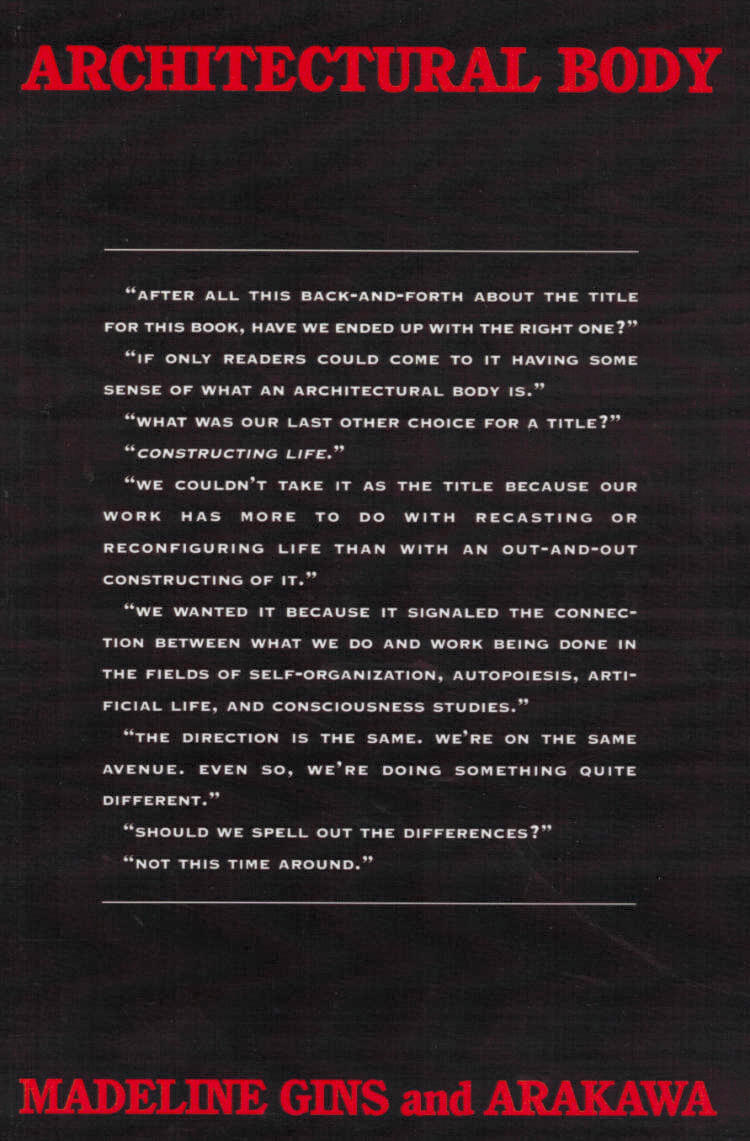
Architectural Body
A verbal articulation of the authors' visionary theory of how the human body, architecture, and creativity define and sustain one another
This revolutionary work by artist-architects Arakawa and Madeline Gins demonstrates the inter-connectedness of innovative architectural design, the poetic process, and philosophical inquiry. Together, they have created an experimental and widely admired body of work, museum installations, landscape and park commissions, home and office designs, avant-garde films, poetry collections, that challenges traditional notions about the built environment. This book promotes a deliberate use of architecture and design in dealing with the blight of the human condition; it recommends that people seek architectural and aesthetic solutions to the dilemma of mortality.
In 1997 the Guggenheim Museum presented an Arakawa/Gins retrospective and published a comprehensive volume of their work titled Reversible Destiny: We Have Decided Not to Die. Architectural Body continues the philosophical definition of that project and demands a fundamental rethinking of the terms "human" and "being." When organisms assume full responsibility for inventing themselves, where they live and how they live will merge. The artists believe that a thorough re-visioning of architecture will redefine life and its limitations and render death passe. The authors explain that "Another way to read reversible destiny... Is as an open challenge to our species to reinvent itself and to desist from foreclosing on any possibility."
Audacious and liberating, this volume will be of interest to students and scholars of 20th-century poetry, postmodern critical theory, conceptual art and architecture, contemporary avant-garde poetics, and to serious readers interested in architecture's influence on imaginative expression.
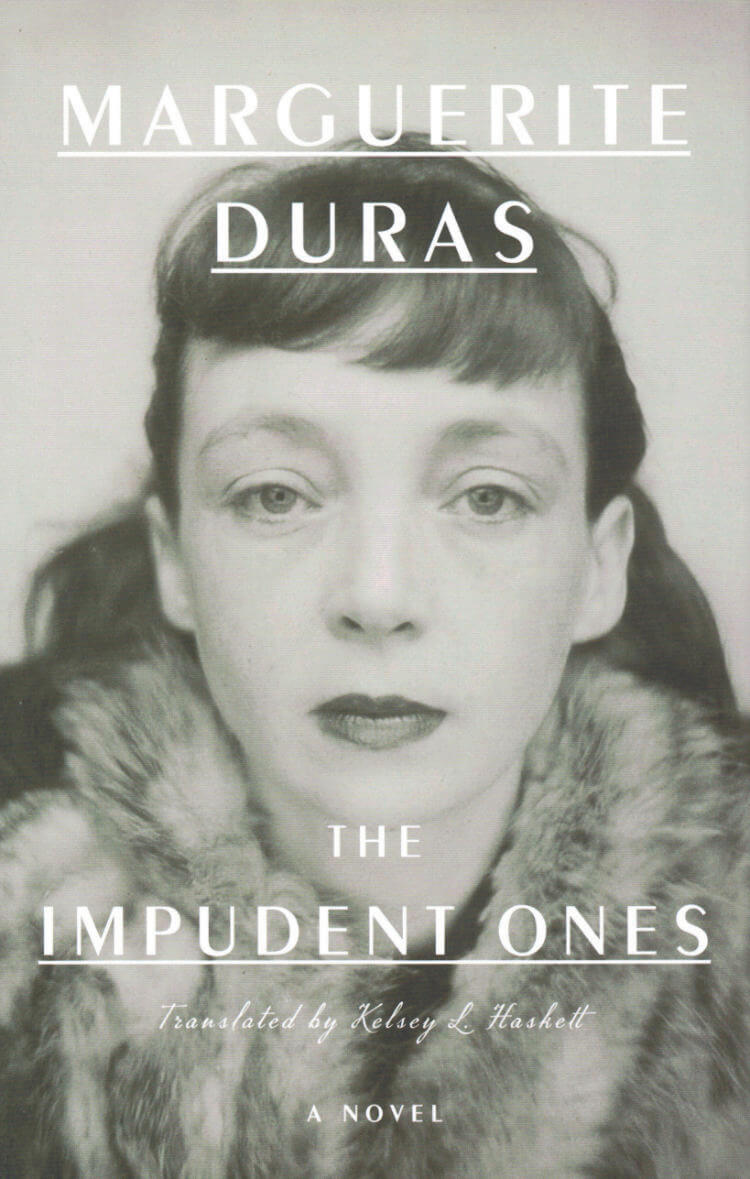
The Impudent Ones
Published for the first time in English, the debut novel of Marguerite Duras, renowned author of The Lover and The War, is the story of a family's moral reckoning and a daughter's fall from grace
Marguerite Duras rose to global stardom with her erotic masterpiece The Lover (L'Amant), which won the prestigious Prix Goncourt, has over a million copies in print in English, has been translated into forty-three languages, and was adapted into a canonical film in 1992. While almost all of Duras's novels have been translated into English, her debut The Impudent Ones (Les Impudents) has been a glaring exception, until now. Fans of Duras will be thrilled to discover the germ of her bold, vital prose and signature blend of memoir and fiction in this intense and mournful story of the Taneran family, which introduces Duras's classic themes of familial conflict, illicit romance, and scandal in the sleepy suburbs and southwest provinces of France.
Duras's great gift was her ability to bring vivid and passionate life to characters with whom society may not have sympathized, but with whom readers certainly do. With storytelling that evokes in equal parts beauty and brutality, The Impudent Ones depicts the scalding effects of seduction and disrepute on the soul of a young French girl.
Including an essay on the story behind The Impudent Ones by Jean Vallier —biographer of the late Duras—which contextualizes the origins of Duras's debut novel, this one-of-a-kind publishing endeavor will delight established Duras fans and a new generation of readers alike.
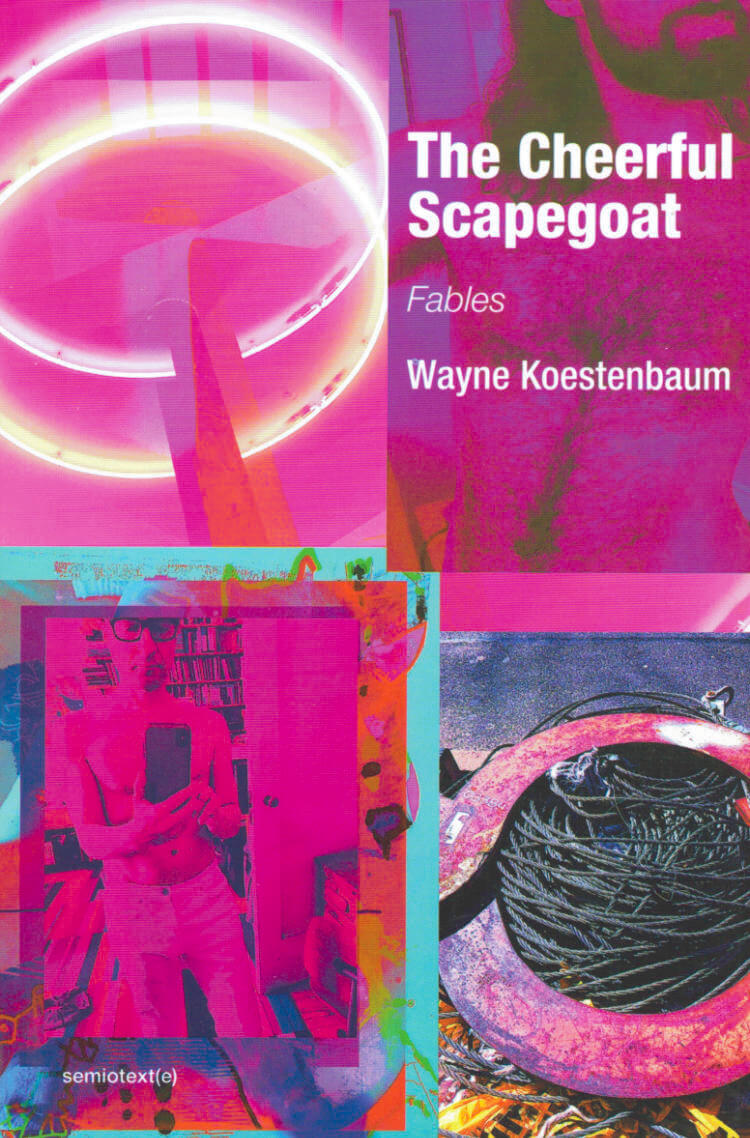
The Cheerful Scapegoat
Wayne Koestenbaum's first book of short fiction: a collection of whimsical, surreal, baroque, ribald, and heartbreaking fables.
In his first book of short fiction—a collection of whimsical, surreal, baroque, ribald, and heartbreaking fables—Wayne Koestenbaum takes the gloom and melancholy of our own terrifying political moment and finds subversive solace by overturning the customary protocols of tale-telling. Characters and narrators wander into strange locales; the difference between action and thinking, between reality and dream, grows moot in a heightened yet burlesque manner. The activities in The Cheerful Scapegoat are a cross between a comedy of manners and a Sadean orgy. Language has its own desires: figures of speech carry an erotic charge that straddles the line between slapstick and vertigo. Punishment hangs over every dialogue—but in the fable-world of The Cheerful Scapegoat, abjection comes with an undertaste of contentment. The tchotchkes of queer culture—codes and signifiers—get scrambled together in these stories and then blown up into an improbable soufflé.
Koestenbaum's fables travel in circles, slipping away from their original point and leading the reader to a paradisiacal suspension of fixed categories. Intensified sentences and curlicue narratives scheme together mesmerically to convince the reader to abandon old ways of thinking and to take on a commitment to the polymorphous, the wandering, the tangential. Koestenbaum's fables—emergency bulletins uttered in a perverse vernacular of syntactic pirouettes—alert us to the necessity of pushing language into new contortions of exactitude and ecstatic excess.
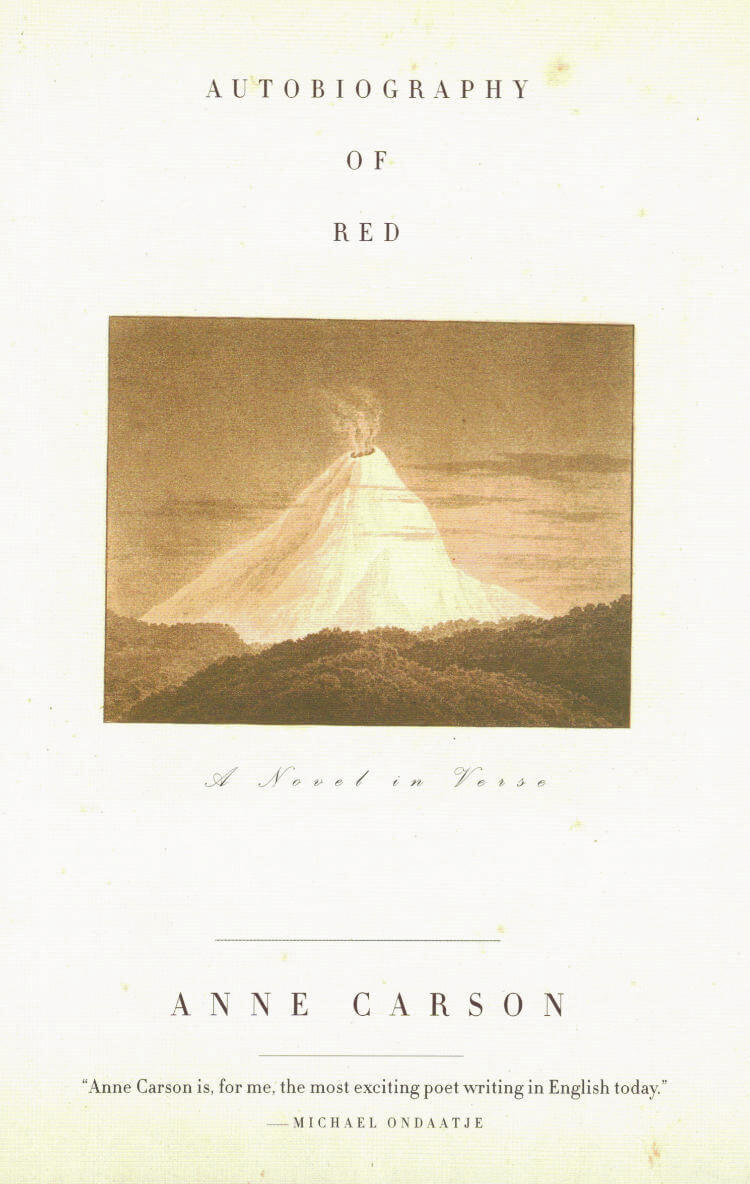
Autobiography of Red
Geryon, a young boy who is also a winged red monster, reveals the volcanic terrain of his fragile, tormented soul in an autobiography he begins at the age of five. As he grows older, Geryon escapes his abusive brother and affectionate but ineffectual mother, finding solace behind the lens of his camera and in the arms of a young man named Herakles, a cavalier drifter who leaves him at the peak of infatuation. When Herakles reappears years later, Geryon confronts again the pain of his desire and embarks on a journey that will unleash his creative imagination to its fullest extent.
By turns whimsical and haunting, erudite and accessible, richly layered and deceptively simple, Autobiography of Red is a profoundly moving portrait of an artist coming to terms with the fantastic accident of who he is.
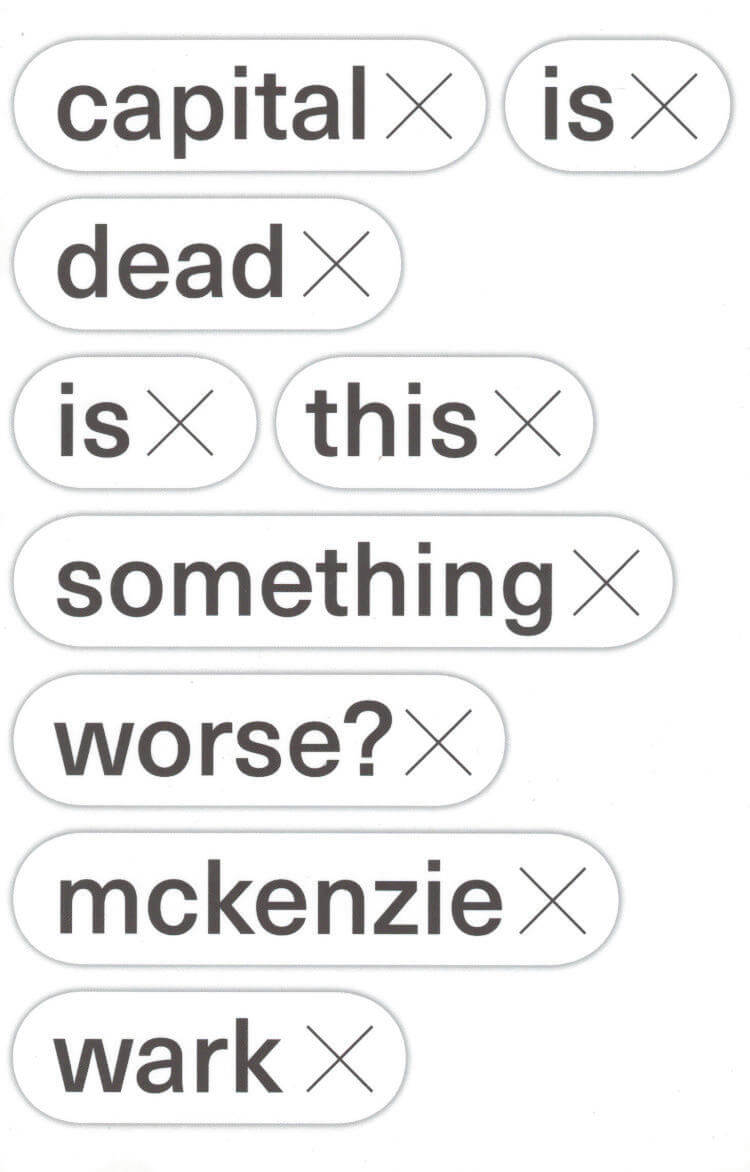
Capital Is Dead: Is This Something Worse?
It's not capitalism, it's not neoliberalism - what if it's something worse?
In this radical and visionary new book, McKenzie Wark argues that information has empowered a new kind of ruling class. Through the ownership and control of information, this emergent class dominates not only labour but capital as traditionally understood as well. And it's not just tech companies like Amazon and Google. Even Walmart and Nike can now dominate the entire production chain through the ownership of not much more than brands, patents, copyrights, and logistical systems.
While techno-utopian apologists still celebrate these innovations as an improvement on capitalism, for workers, and the planet, it's worse. The new ruling class uses the powers of information to route around any obstacle labor and social movements put up. So how do we find a way out? Capital Is Dead offers not only the theoretical tools to analyze this new world, but ways to change it. Drawing on the writings of a surprising range of classic and contemporary theorists, Wark offers an illuminating overview of the contemporary condition and the emerging class forces that control, and contest it.

Symbiotic Planet: A New Look at Evolution
Although Charles Darwin's theory of evolution laid the foundations of modern biology, it did not tell the whole story. Most remarkably, The Origin of Species said very little about, of all things, the origins of species. Darwin and his modern successors have shown very convincingly how inherited variations are naturally selected, but they leave unanswered how variant organisms come to be in the first place.
In Symbiotic Planet, renowned scientist Lynn Margulis shows that symbiosis, which simply means members of different species living in physical contact with each other, is crucial to the origins of evolutionary novelty. Ranging from bacteria, the smallest kinds of life, to the largest, the living Earth itself, Margulis explains the symbiotic origins of many of evolution's most important innovations.
The very cells we're made of started as symbiotic unions of different kinds of bacteria. Sex, and its inevitable corollary, death, arose when failed attempts at cannibalism resulted in seasonally repeated mergers of some of our tiniest ancestors. Dry land became forested only after symbioses of algae and fungi evolved into plants. Since all living things are bathed by the same waters and atmosphere, all the inhabitants of Earth belong to a symbiotic union. Gaia, the finely tuned largest ecosystem of the Earth's surface, is just symbiosis as seen from space.
Along the way, Margulis describes her initiation into the world of science and the early steps in the present revolution in evolutionary biology; the importance of species classification for how we think about the living world; and the way academic apartheid can block scientific advancement. Written with enthusiasm and authority, this is a book that could change the way you view our living Earth.